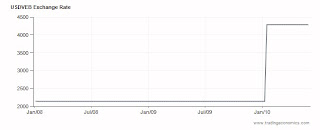In yesterday's post Why The Current Market Volatility Does Not Imply A Repeat Of 2008, I made many references to Venezuela as example.
Here are some revealing charts...(except for the Bolivar money base all the rest are from tradingeconomics.com)
Here are some revealing charts...(except for the Bolivar money base all the rest are from tradingeconomics.com)
While Venezuela is clearly in a stagflation phase there seems to be a big possibility that these would transmogrify into a hyperinflation, which I think could occur anytime within the next 3 years, given the current pace by which Mr. Chavez seems to be financing his conversion of Venezuela into a socialist nation.
Jonathan Finegold Catalan at mises.org dwells deeper into the Venezuelan disease.
Here is an excerpt,
``By printing money, Venezuela's central bank and government are not creating capital, they are only funding their ability to bid it away from the private sector and squander it on uneconomical public programs. Imagine the average Venezuelan who receives nothing but a currency that is consistently falling in value in exchange for his resources. Simultaneously, his savings are confiscated, because they are progressively worth less in the face of rising prices. How can anybody consider this a basis for a rise in wealth?
``In Venezuela, entrepreneurship is condoned when it doesn't interfere with the plans of Hugo Chavez. Unsurprisingly, entrepreneurs in the utility industries are not part of Chavez's plans, and as such the Venezuelan utility market has been almost completely nationalized. While prior to the recent global depression Chavez stuck to nationalizing certain sectors at a relatively slow (yet steady) pace, the onset of global crisis accelerated the socialization of Venezuela's economy. Indeed, few foreign-owned oil companies were left untouched after Chavez decided to solve his debt problem by simply taking over those businesses he owed money to.
``Other key industries nationalized include the telecommunication and electrical markets. Admittedly, Chavez's nationalizations did not consist solely of expropriating the property of others for the benefit of the "people of Venezuela." Like any good politician, Chavez pandered to big business, offering two Spanish electrical companies, Iberdrola and Elecnor, a total of nearly two billion dollars to build a 1000Mw electrical plant in the city of Cumaná, in eastern Venezuela. The average construction cost for the specific type of plant being built was $0.75 a watt. Chavez paid Iberdrola and Elecnor $2 a watt."
Read the rest here





No comments:
Post a Comment